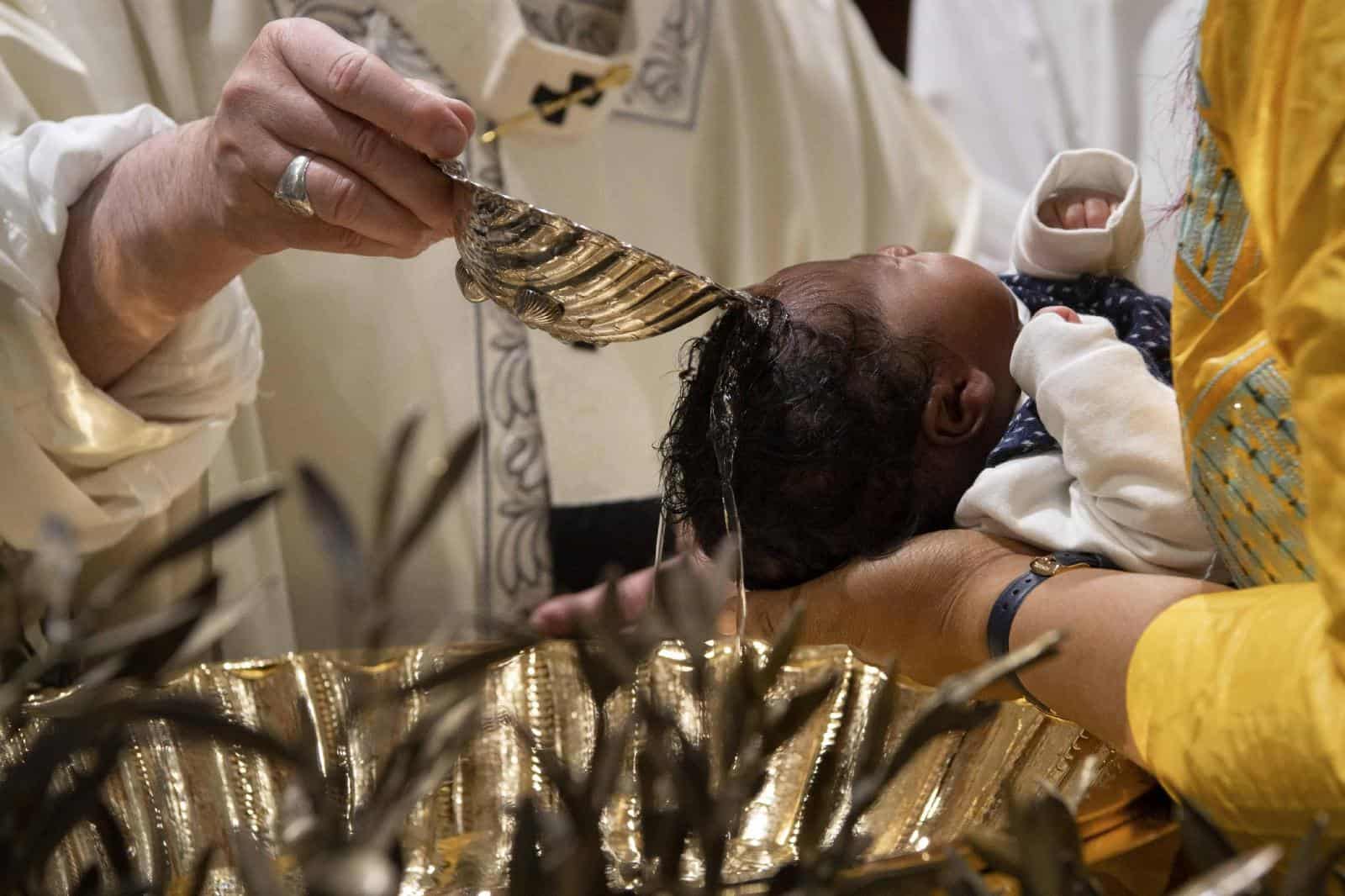You’ve just had a baby! Or, you’re going to have a baby! Either way, congratulations! Hopefully everyone is healthy and happy.
Once you’re home from the hospital and settling into your new sleep-deprived routine, it might be time to begin making some plans to get your child baptized. If you’re into planning, you could even start this process before the delivery.
“Wait, but why?”
Like all of the sacraments, baptism is primarily about our connection to Jesus Christ. Jesus himself was baptized at the beginning of his ministry, and baptism has been a hallmark of Christian identity since the time of the apostles. To quote the Catechism, “Through baptism we are freed from sin and reborn as [children] of God; we become members of Christ, are incorporated into the Church, and made sharers in her mission.”1
In other words, baptism connects us to Christ, and through him connects us to all of the other baptized.
“Ok, so what do I do now?”
The best and only universally-applicable instruction I can give you in this article is this: contact your local parish. Call them up, and you’ll likely get a very friendly and helpful person working in the parish office. They’ll be able to talk you through all of the planning and particulars.
Many parishes have a preparation class for the parents, particularly if this is your first child. Going to this class will give you a chance to meet other young parents at your parish and learn more about baptism.
Similarly, many parishes already have set dates for when they normally celebrate baptisms. For example, your parish might have baptisms after one of the Masses every first and third Sunday of the month, or something like that. You might find this schedule on your parish website. Otherwise you’ll likely hear about it when you call the parish office or at the preparation class.
No matter what the particularities of your parish are, the parish office is now your best source of information. Honestly, once you’re in contact with someone there, you could probably stop reading this article (although I hope you don’t!).
“We don’t have a regular parish.”
No problem, this could be a great chance to find a faith community wherever you’re living. You can likely find your local parish through your diocese’s website or just through a Google search. Alternatively, if there’s a parish in your area that you know you’d like to join, just give them a call.
“What if I want to have my child baptized somewhere else?”
The parish where you’re a member is the usual option for where to have your child baptized. That said, there might be a good reason to have your child baptized elsewhere. Elderly relatives who can’t travel, a strong connection to the parish you grew up in, having the baptism closer to where most of the guests live, or a close relationship with a priest or deacon who you want to baptize your child could all be cause to have the baptism somewhere other than your home parish.
If this is the case for you, it’d be best to contact the parish where you want to have the baptism to explain your situation. They’ll be able to talk you through their own particulars regarding preparation classes, schedules, and so forth.
“So how do I go about choosing godparents?”
The role of godparents is incredibly important. Godparents serve as models of faith and help the parents to raise the child in leading a Christian life.2
You need to have at least one person, and no more than two, who meets the following criteria:
- Designated by the parents (I know, this seems one seems obvious. But, to quote one of my former spiritual directors, “Every rule comes from somewhere!”)
- At least 16 years old3
- A practicing Catholic who has been confirmed and received First Communion
- Not the child’s father or mother (Sorry parents, you’ve gotta choose someone else!)
“What if I want to pick someone to be a godparent who doesn’t meet all of the criteria? Or what if I want to choose two people of the same sex? Can I do that?”
As long as you’ve got one person who meets the above criteria, the baptism can happen. You actually only “need” one godparent. If you want your child to have a godfather and a godmother, then you’ll need to find one man and one woman who both meet the above criteria.
If you want to have two people of the same sex be godparents to your child and they both meet the above criteria, you’re fine. On the formal documentation, one will be listed as the “sponsor” (read: official godparent) and the other will be listed as the “witness of the baptism.”
In fact, any baptized Christian can be a “witness of the baptism,” to pair alongside an official Catholic godparent. Maybe you have a close friend who is – *gasp* – a Lutheran! – who you think would be a great Christian role model to your child. Great, you’ve got yourself a witness of the baptism. If you’ve got a friend who is Jewish, Hindu, or of any other non-Christian religion, they cannot be listed as a witness of the baptism. No matter how virtuous they are or how well they live out their own faith, baptism is about our belief in Christ. Again, the goal of choosing a godparent is to find someone who will help your child grow as a disciple of Christ.
*****
The Ceremony
Alright, you’ve contacted your parish, you’ve attended the preparation classes, you’ve got godparents picked out, and your parents are even flying in to be there. Let’s baptize that baby!
Baptisms can happen either during or outside of Mass. Your local parish likely has a custom for which of these two options it follows. The ceremony itself looks pretty similar in either of these situations.
Talking through every single aspect of the Rite of Baptism would take far too long, plus I don’t want to steal the thunder of whoever runs the preparation class you might wind up attending. So here are some key parts.
Prayer of Exorcism
Yeah, you read that right. No, your baby isn’t possessed, no matter how loudly they scream and cry. The key line of this prayer is, “We pray for this child: set him/her free from original sin, and make him/her a temple of your glory, and send your Holy Spirit to dwell with him/her.” This prayer is about cleansing the baby from original sin, which is one of the key effects of baptism.
Renunciation of Sin and Profession of Faith
This is the big moment for the parents and godparent(s). The priest or deacon will ask them if they reject Satan, all his works, and all his empty promises. If these phrases sound familiar but you can’t quite place them, you might be thinking of this famous scene from The Godfather.4 After the renunciation of sin, the priest or deacon will ask the parents and godparents to affirm the statements of the Apostles’ Creed.
The Baptism
Now it’s the big moment for the baby! The priest or deacon will pour water over the child’s head, saying, “I baptize you in the name of the Father, and of the Son, and of the Holy Spirit.” It is absolutely essential that these are the exact words that are used. Any alterations to this phrasing make the baptism invalid, which can cause a real headache down the road.
As soon as the priest or deacon pours the water and says those words, congratulations! Your child is now the newest member of the Christian community!
Anointing after Baptism
After the pouring of the water, the priest or deacon will anoint your child’s head with sacred chrism, a perfumed oil which might be the best-smelling substance in the universe.5 Chrism only gets used for three things: anointing the newly-baptized, anointing people receiving the sacrament of confirmation, and anointing the hands of newly-ordained priests. The fact that chrism is only used for these three moments speaks to the power of baptism. Its connection to confirmation points out how baptism begins the process of initiation into the Christian community, which will be completed at confirmation. Chrism’s symbolism of the connection between baptism and ordination should remind us that all of the baptized, not just the ordained, are called to make the world a holier and more just place.
The ceremony will wrap up with the presentation of a white garment, the lighting of your child’s baptismal candle, and the closing prayers.
*****
Baptism is a beautiful and holy sacrament. Please do reach out to your local parish to begin your child’s initiation into the Christian community. And congratulations on your growing family!
- Catechism of the Catholic Church #1213. ↩
- Sometimes they even eventually (at least 21 years later) buy their godchild books about religiously-themed cocktails. Thanks, Aunt Phyllis! ↩
- The minimum age is 16 in most places. Local bishops and pastors can make exceptions if there’s a compelling reason. ↩
- Parents, if you have any reason whatsoever to believe that your child’s potential godparent might be organizing the systematic assassinations of their organized crime rivals before, during, or after your child’s baptism, I insist you choose someone else to be your child’s role model in faith. ↩
- Freshly-baked chocolate chip cookies are the only other viable contender for this title by my estimation. ↩


